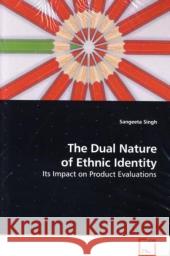The Dual Nature of Ethnic Identity : Its Impact on Product Evaluations » książka
The Dual Nature of Ethnic Identity : Its Impact on Product Evaluations
ISBN-13: 9783639181517 / Angielski / Miękka / 2009 / 156 str.
Ethnic identity has been treated as a unidimensional construct with ethnic and majority group identifications on opposite ends of the continuum. Such a conceptualization implies that identification with one of the groups is necessarily accompanied by the rejection of the other. This dissertation proposes ethnic identity to be composed of at least two dimensions, one corresponding to the identification with the ethnic group and the other to that with the majority group. The dual nature of ethnic identity suggests that it is possible for an individual with such an identity to have the two components differentially salient in different circumstances. An empirical study employing a sample of Asian Indians residing in the United States is conducted to establish the dual structure of ethnic identity and is then used for explaining the variability in consumers product evaluations under different consumption situations. The differential saliency of the two dimensions are explained not only by the cultural orientation of the consumption situation but also that of the product being consumed. The implications of these findings for marketing practitioners and researchers are discussed.











